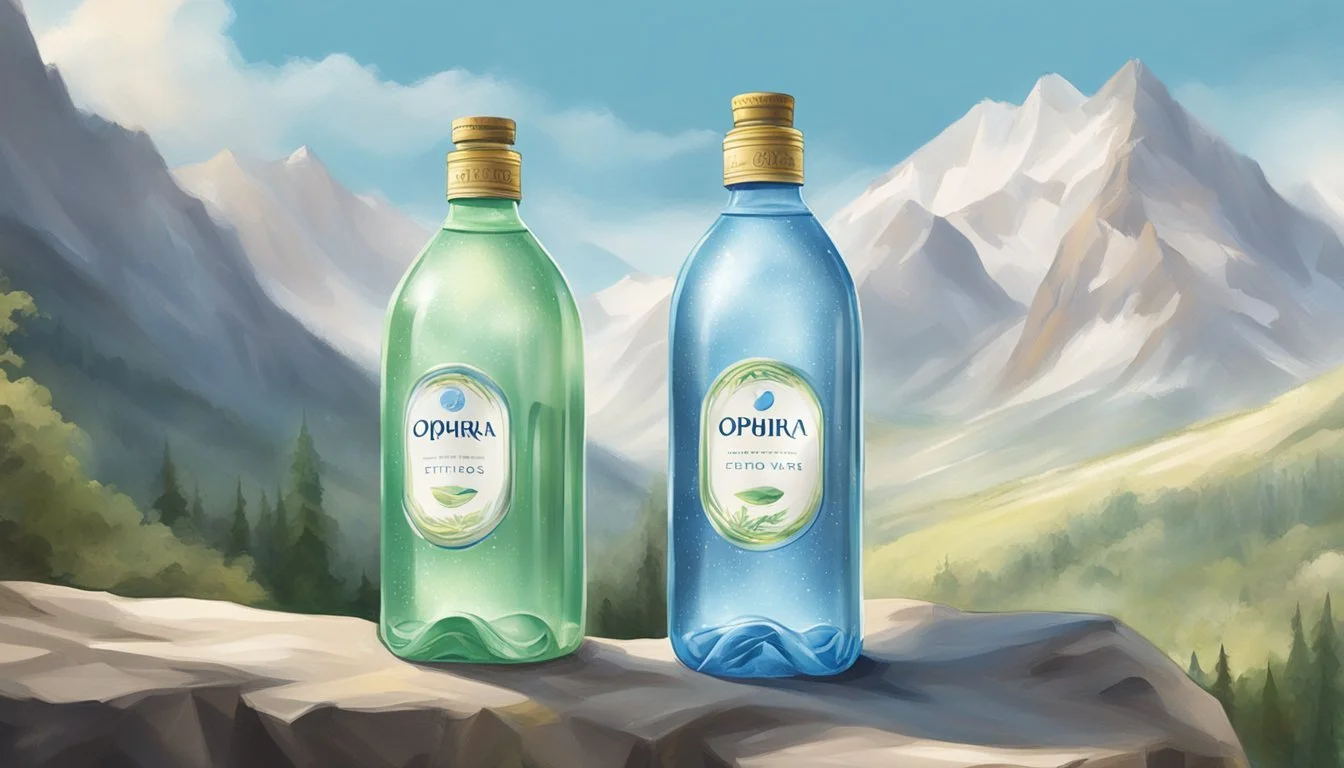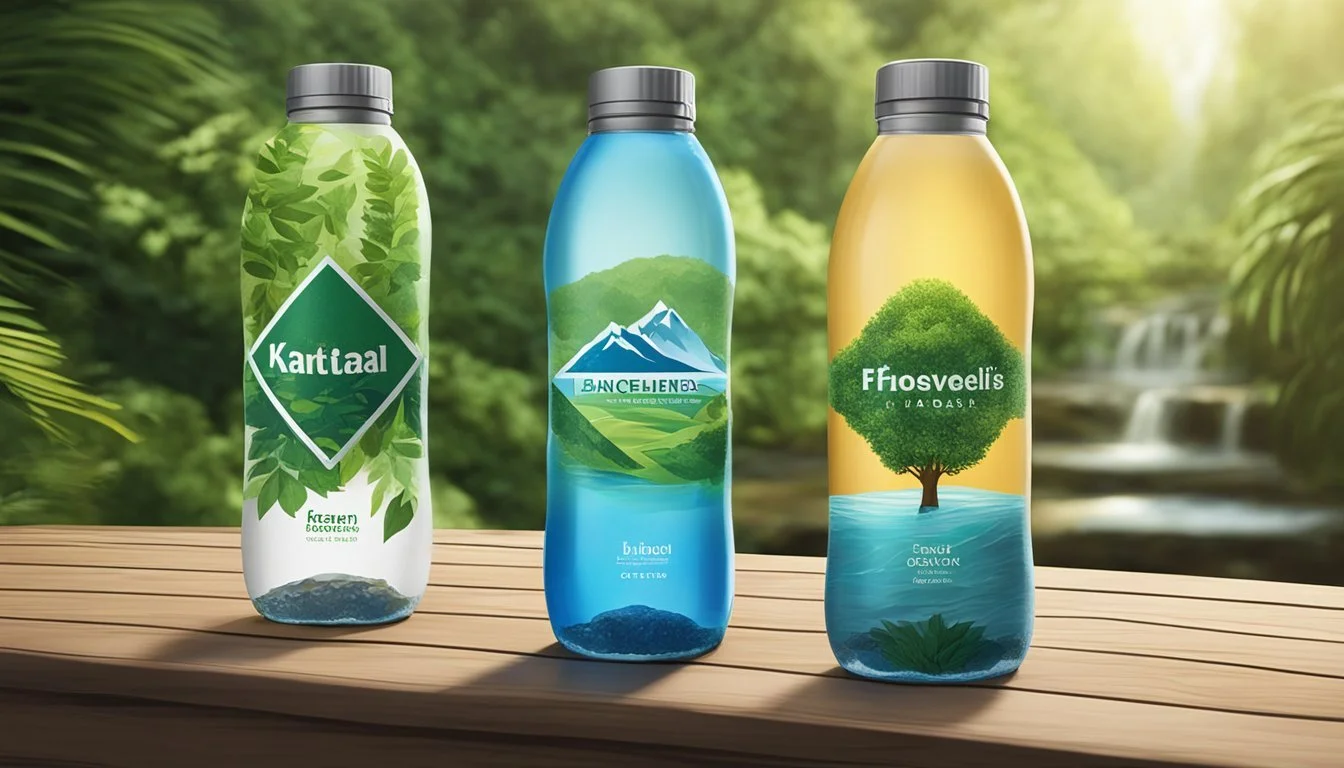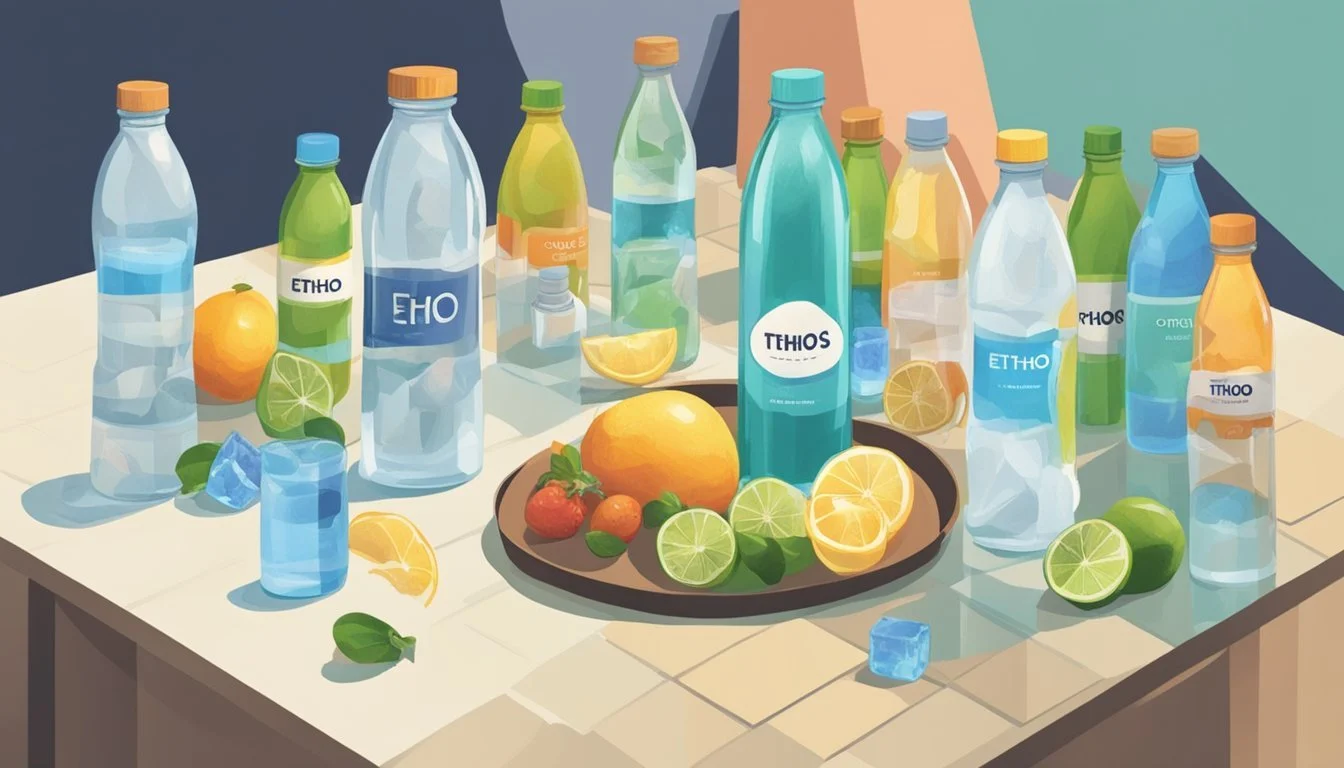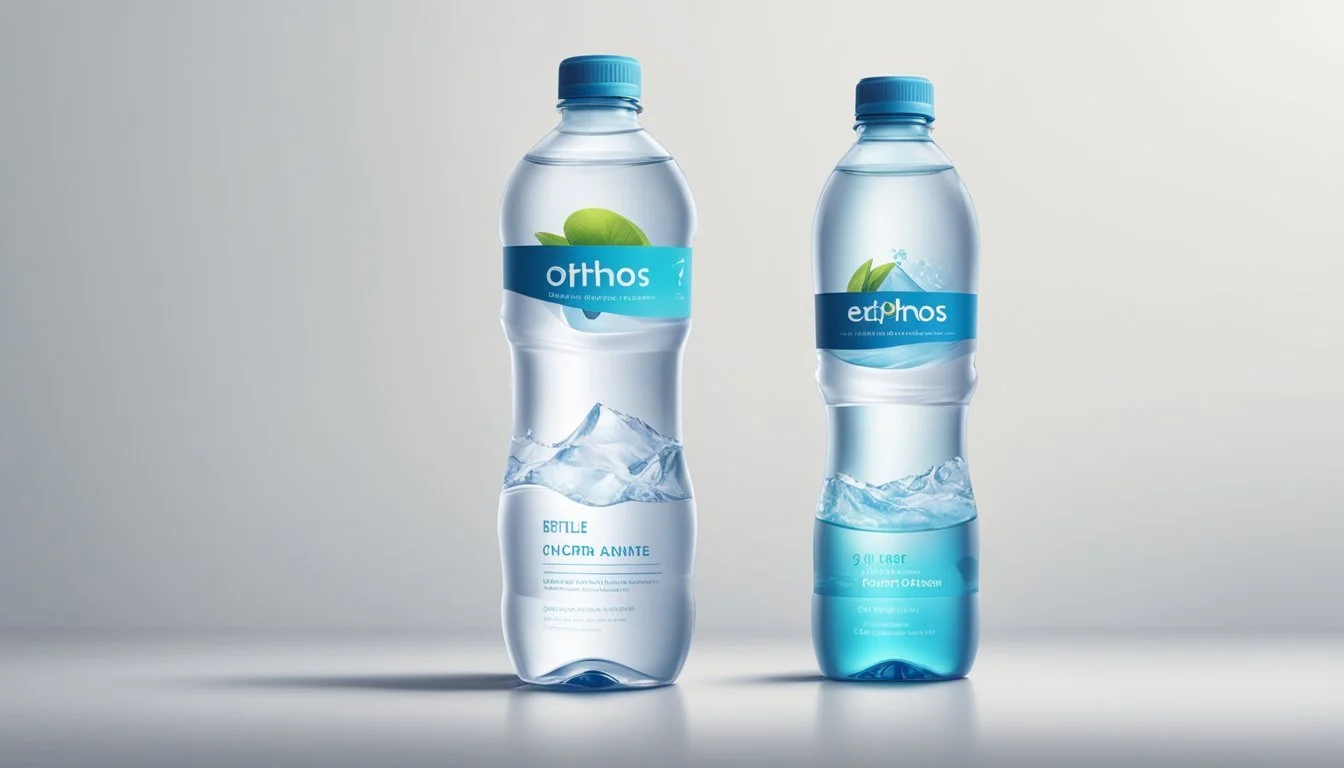Ethos vs. Ophora
Which Bottled Water is Better for You?
Choosing the best bottled water often involves weighing various factors, such as taste, quality, and benefits. When comparing Ethos and Ophora, the decision becomes even more interesting due to their unique approaches to hydration. Ethos stands out for its commitment to sustainability and charitable initiatives, making it a socially responsible choice.
On the other hand, Ophora emphasizes its advanced purification process and oxygen-rich formula, appealing to those who prioritize the health benefits of their water. Both brands offer excellent hydration, but their distinct features cater to different preferences and priorities. For individuals seeking both high-quality hydration and a positive environmental impact, Ethos may be the preferable option.
In contrast, those looking for enhanced wellness benefits through superior purification and added oxygen might find Ophora to be the better choice. This comparison highlights the diverse options available in the bottled water market, encouraging consumers to select the brand that best aligns with their values and needs.
Understanding Bottled Water
Bottled water comes in various types and serves multiple purposes, from satisfying daily hydration needs to offering specific health benefits. Understanding the different aspects of bottled water will help consumers make informed choices.
The Basics of Bottled Water
Bottled water is simply water sealed in bottles for consumption.
Key considerations include:
Source: The origin of the water, whether from springs, wells, or public sources.
Treatment: Processes used to purify or enhance the water.
Packaging: Materials used for bottles, often emphasizing sustainability and recyclability.
Bottled water is preferred for its convenience, safety, and taste. Brands often stress their commitment to quality, with some providing additional value through charitable initiatives or environmental efforts.
Types of Bottled Water
Various types of bottled water cater to different preferences and needs:
Purified Water: Treated to remove contaminants, making it highly pure.
Spring Water: Collected from natural springs, often rich in minerals.
Mineral Water: Contains naturally occurring minerals, beneficial for health.
Alkaline Water: Has a higher pH, which some believe offers health benefits.
Sparkling Water: Carbonated for a fizzy experience, often enjoyed as an alternative to sugary drinks.
Each type serves distinct tastes and health requirements, so understanding these can help select the right option.
Health and Hydration Benefits
Hydration is crucial for overall health and well-being.
Benefits of bottled water include:
Quality Control: Rigorous testing ensures safety and purity.
Mineral Content: Essential minerals in spring or mineral water can support health.
Convenience: Easily portable, aiding regular hydration.
Specialty Waters: Options like alkaline or mineral water can provide specific health benefits, such as improved pH balance or enhanced nutrient intake.
Regular consumption of bottled water ensures that individuals meet their hydration needs while potentially reaping additional health benefits.
Brand Overview
Ethos Water and Ophora Water cater to different market segments, reflecting their unique selling points and pricing. This section explores their origins, characteristics, and how they compare with other well-known bottled water brands.
Ethos Water: Starbucks' Choice
Ethos Water is a bottled water brand owned by Starbucks. It is often available at Starbucks locations. The brand was established with a charitable mission, aiming to provide clean water to children in developing countries.
Ethos Water sells for around $1.95 per bottle, making it relatively affordable. It stands out for its social initiative, dedicating a portion of its profits to water programs globally. The water itself is sourced from various springs in the United States.
Ethos Water combines accessibility with a socially responsible mission, appealing to environmentally and socially-conscious consumers.
Ophora Water: High-End Hydration
Ophora Water presents itself as a premium brand emphasizing wellness and superior quality. It is known for undergoing rigorous purification processes. Techniques such as ozone treatment and ultra-purification ensure high purity levels.
Ophora Water often boasts a high price point, reflecting its luxury market position. The brand targets health-conscious individuals seeking optimal hydration benefits. It is marketed as oxygen-enhanced, claiming various health benefits.
The brand's commitment to advanced purification and wellness features differentiates it from more common water brands like Aquafina or Dasani.
Comparison with Other Brands
When it comes to bottled water, both Ethos and Ophora offer unique propositions. Ethos Water, with its social mission, contrasts significantly with the affordable options from Pure Life and Dasani. Meanwhile, Ophora's emphasis on purification and wellness positions it alongside other high-end brands like Evian, Fiji, and Essentia.
Ethos Water’s affordability and social commitment make it accessible, while Ophora Water focuses on providing premium, health-oriented hydration solutions. This diverse approach differentiates them from standard brands such as Aquafina and Smartwater, offering consumers specific benefits based on their individual preferences and values.
In summary, both brands excel in their niches—Ethos for its social impact and Ophora for its premium health benefits.
Source and Purification Processes
The sources and purification processes of Ethos and Ophora water brands are fundamental to their distinct qualities. Ethos utilizes advanced filtration technology, while Ophora employs a unique nano-purification process to ensure cleanliness and maintain an alkaline pH.
Ethos Water Source and Filtration
Ethos sources its water from various springs and groundwater locations. The purification process involves the proprietary Hydro-7™ method, which includes seven detailed steps:
Micro-filtration
Activated carbon filtering
Reverse osmosis
UV exposure
Ozonation
This system ensures that the water is free from impurities and retains a clean and fresh taste. Ethos water is also infused with electrolytes to enhance hydration.
Ophora Water Source and Nano-Purification
Ophora sources its water from high-quality groundwater locations. Its purification process is highly advanced, including multiple nano-filtration stages and ionization.
The water undergoes:
Initial micro-filtration
Nano-purification
Ultraviolet light exposure
These techniques not only remove contaminants but also ensure the water remains alkaline with a pH of 9.5. This alkaline nature makes Ophora stand out among premium bottled water brands.
Reverse Osmosis and Other Methods
Reverse osmosis is a common method used by both Ethos and other brands like Ice Mountain to purify water. This process involves forcing water through a semipermeable membrane to remove impurities.
Steps in reverse osmosis:
Pre-filtration
Pressure application
Membrane filtration
Post-filtration
Ethos combines reverse osmosis with additional steps like activated carbon filtering, while Ophora uses nano-purification. These diverse methods highlight the commitment to providing pure and high-quality water free from pollutants and contaminants.
Taste and Quality Considerations
Ethos and Ophora offer unique qualities that impact their taste and overall drinking experience. Key factors such as mineral content, pH levels, and specific taste profiles define these differences.
Factors Influencing Water Taste
Several factors influence the taste of bottled water. Mineral content plays a significant role. Calcium, magnesium, and sodium can add subtle flavors.
Water source is another important element. Natural spring waters can have distinct tastes based on geographic location.
Additionally, purification processes like reverse osmosis or distillation can remove impurities, altering the flavor. Water pH levels, though often overlooked, can also influence taste perception, making some waters taste more acidic or alkaline.
Ethos vs. Ophora Taste Profile
Ethos water is known for its clean and crisp taste. It uses ultra-purified water with added electrolytes to enhance flavor.
Ophora, on the other hand, is reputed for its luxurious mouthfeel, often described as smooth and slightly sweet. Its source from natural springs contributes to this unique profile.
Unlike Ethos, which emphasizes purity, Ophora contains a higher mineral content, offering a more robust flavor that appeals to discerning taste buds.
pH Levels and Mineral Content
pH levels significantly affect water taste. Ethos typically maintains a neutral pH around 7, achieving a balanced taste profile.
Ophora often has a slightly alkaline pH, generally ranging between 7.5 and 8.5. This higher pH can create a smoother sensation.
In terms of minerals, Ethos incorporates essential electrolytes like potassium and calcium for hydration benefits. Ophora's mineral content is higher, particularly in calcium and magnesium, enhancing both taste and potential health benefits.
Each brand's approach to mineral content and pH levels results in distinct taste experiences, catering to different consumer preferences.
Health and Environmental Impact
Both Ethos and Ophora bottled waters have distinct attributes in terms of health benefits and environmental considerations. This section explores the specifics of these aspects.
Comparing Health Benefits
Ethos Water is known for its commitment to providing clean water. The brand sources its water from springs, ensuring a balance of minerals beneficial for health. Ethos water generally contains low levels of contaminants and no detectable PFAS chemicals. Due to careful sourcing, Ethos is free of BPA, commonly found in plastic bottling.
Ophora Water differs by leveraging advanced filtration to deliver ultra-pure water with added oxygen. This makes it particularly appealing to health-conscious consumers. Ophora ensures the removal of contaminants, uses BPA-free packaging, and maintains a high standard for water purity, reducing exposure to potentially harmful substances.
Packaging and Environmental Concerns
Ethos contributes to environmental sustainability through the Ethos Water Fund, which supports global water and sanitation projects. However, its use of plastic bottles raises concerns about environmental impact, particularly regarding plastic waste and carbon footprint.
Ophora emphasizes eco-friendliness by using glass bottles, reducing plastic pollution and the risk of BPA contamination. Glass packaging is more sustainable but heavier and more energy-intensive to transport. Hence, while Ophora’s approach is environmentally friendly, it faces logistical challenges.
In summary, Ethos focuses on social impact and balanced mineral content, while Ophora prioritizes purity and environmentally conscious packaging choices. Each brand offers unique benefits and challenges in health and environmental dimensions.
Price and Accessibility
Ethos and Ophora offer unique pricing structures and distribution channels. While Ethos is widespread and cost-effective, Ophora targets a premium market with a specialized focus.
Cost Comparison
Ethos Water generally retails at a lower price point, making it accessible to a broader audience. A standard 1-liter bottle typically costs around $2.00. This affordability aligns with its socially responsible mission and broad consumer base.
Ophora Water, on the other hand, is positioned as a luxury product. A similar 1-liter bottle can cost $8.00 or more. This premium pricing reflects its advanced filtration process and health-oriented features, making it less accessible for everyday consumers but appealing to those seeking high-quality, specialized water.
Brand Cost (1L Bottle) Ethos $2.00 Ophora $8.00+
Retail Availability
Ethos Water benefits significantly from its partnership with Starbucks, resulting in widespread availability across their coffee shops. Additionally, Ethos is found in many local grocery stores and large retail chains, enhancing its convenience for consumers.
Ophora, relatively exclusive, is less commonly found in general grocery stores. It's primarily sold in specialty health and wellness shops and through direct online sales. This limited distribution can affect its convenience, making it a more niche product for a select market.
Brand Availability Ethos Starbucks, grocery stores, retail chains Ophora Specialty shops, online sales
Consumer Opinions and Preferences
Ethos and Ophora bottled waters have garnered significant consumer attention, with notable differences in customer reviews and market trends influencing their popularity.
Customer Reviews and Ratings
Ethos Water, primarily available through Starbucks, is praised for its clean taste and philanthropic mission. Consumers often rate it highly for its balanced flavor and the sense of contributing to a good cause. Ethos consistently appears in lists of top picks for its social impact, despite some criticism over its plastic packaging.
In contrast, Ophora Water is often lauded for its purity and unique oxygenation process. It is frequently highlighted in rankings of the best bottled waters, appealing particularly to health-conscious consumers. However, Ophora's premium price point can be a deterrent, reflecting mixed reviews regarding value for money.
Market Trends and Consumer Choices
Market trends indicate a growing preference for bottled waters that offer health benefits and sustainability. Ethos leverages its social mission to attract customers who prioritize ethical purchasing decisions. This trend is reflected in its strong presence in urban areas where Starbucks outlets are plentiful.
Ophora caters to a niche market that values advanced water purification and health benefits, positioning itself at the higher end of the price spectrum. The rise in consumer interest in wellness products contributes to the increasing popularity of brands like Ophora, despite their premium pricing.
As consumers become more environmentally conscious, the emphasis on recyclable packaging and sustainable practices influences their choices, with both Ethos and Ophora benefiting from this shift, albeit in different segments of the market.
Final Verdict
Ethos and Ophora offer distinct characteristics in their bottled water, catering to diverse preferences regarding taste, sustainability, and social impact. Both brands adhere to stringent quality standards, yet they prioritize different values and approaches.
Summarizing the Comparison
Ethos Water is well-regarded for its commitment to charitable contributions. For every bottle sold, a portion of profits supports clean water programs in underprivileged communities. This focus on social impact sets Ethos apart.
In contrast, Ophora emphasizes the purity and luxury of its water. Marketed as ultra-pure and oxygen-rich, it appeals to consumers seeking high-end water options. Ophora also highlights its advanced filtration processes and adherence to FDA regulations.
Expert Recommendations
Water sommeliers often examine factors like source, mineral content, and taste. Ethos is frequently praised for its ethical stance but may fall short in taste tests compared to luxury brands.
Conversely, Ophora's taste profile often receives high marks. Its source and advanced purification techniques add to its appeal among water connoisseurs. Despite a higher price point, experts recommend Ophora for those prioritizing taste and purity.
More About Ethos
Ethos vs Mountain Valley Spring Water: Which Bottled Water is Better?
Ethos vs Richard's Rainwater: Which Bottled Water is Better?
Ethos vs Whole Foods Italian Still Mineral water: Which Bottled Water is Better?







